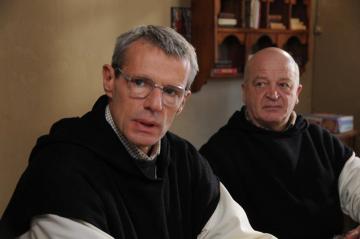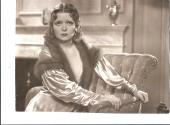'Of Gods and Men' weaves spiritual tale
"Men never do evil so completely and cheerfully as when they do it for religious conviction."---Pascal
The eight monks at the Cistercian monastery live in -- if not the Garden -- at least a little Oasis of Eden.
They and "Of Gods and Men," Xavier Beauvois' wrenchingly beautiful film about them, are situated in an isolated mountain village in North Africa, where their community coexists quietly, contemplatively and peacefully with their Muslim brothers and sisters. Cistercians follow the seventh-century monastic order of St. Benedict and never proselytize or otherwise disturb the people among whom they live.
On the contrary, they serve them whenever and however they can. Old Brother Luc (Michael Lonsdale), for example, is a doctor, who treats the many villagers who come to him for help every day. Best evidence of harmony comes in a long, slow pan of faces at a Muslim prayer service: It ends on the face of Brother Luc -- respectfully attending and listening to the imam's prayers, along with the villagers.
But the tranquil rhythms of monastic life there -- praying, farming, beekeeping -- are seriously shaken when a crew of Croatian workers outside the village is massacred by al-Qaida-like Islamic radicals. They have issued an ultimatum ordering all foreigners to leave the country -- including the monks.
Mr. Beauvois' film is based on a shockingly true story: the 1996 kidnapping and disappearance of seven French Cistercian-Trappist monks in Tibkirine, Algeria. In that real event, and in this fictionalized rendering, the monks decline military protection and refuse to leave.
But there's rare dissension in the monastic ranks about the security threat and decision to stay -- the most painful decision they've ever had to make. Caught between the terrorists and the army, they must walk an increasingly dangerous tightrope between the two sets of men, and another fine line between God and themselves. To leave would be to surrender and walk away from their literal and figurative "mission" -- not to mention their deep ties and love of the villagers.
Most agonizing, however, is the challenge to personal faith and commitment to the monks' most basic Christian beliefs. How can you have an unseemly fear of death if you believe in Psalm 23, "Yea, though I walk through the valley of the shadow of death, I will fear no evil," and in Luke 17: "He who tries to save his life shall lose it, but whoever loses his life will save it."
In most films, music "accompanies" words and "scores" (as in underscores) the dialogue. In this one, it largely replaces dialogue. The monastery is, after all, a world of silence. The Psalms (literally, "songs") are universally considered the most lyrically exquisite part of the Bible. Stripped of instruments, "naked" chant lets you tune in and gradually realize you don't know these texts as well as you think you did. If you, like the monks, let yourself do it, you'll be as transformed as they are by the strange tonality and the message that elevates and unites them. Singing is an integral part of their lives and the film; the Liturgy of the Hours happens seven times a day and is essential to their union and communion as a spiritual force. This semi-Gregorian chant, with its strangely modern, subtly dissonant melodic and harmonic variations, becomes the lingua franca of their debate and dialectic.
The film's magnificent, excruciating, transcendent Last Supper scene employs the famous "Lac de Cygnes" (how's your French?) score, and is perhaps the most powerful use of secular music for character and narrative purposes I've ever seen in a film.
If ever you (and I) regretted not taking that upper-level French course, it'll be here. The subtitles are excellent, but English-speaking audiences are disadvantaged for relying on them. But it's not a crippling disadvantage, thanks to the superb acting. Lambert Wilson as Brother Christian, the abbot, is a deeply loving, protective shepherd to his flock. And "Thou shalt not steal" applies unless thou art Michael Lonsdale, in which case you have special dispensation to steal all scenes in which you appear. For that matter, all the monks are riveting, each face and personality uniquely empathetic in response to the crisis.
This slow, contemplative tragedy -- a best foreign film Oscar nominee -- will powerfully affect Christians & non-Christians alike, but especially Catholics. (It could and should be screened at parochial schools, relevant and terribly timely as it is to the slaughter of UN workers in Afghanistan last week.) FYI, its sole scene of bloody violence occurs toward the beginning and does not involve the monks.
But it is emotionally rough. Of the Big Three -- faith, hope and love -- faith is the tricky one that can get so easily twisted from a virtue into a vice. What's the real difference between radical Islam and Quran-burning Christians in the inflammatory ability of both to incite madness? Bible and Quran thumpers-and-burners are all alike. But there's not one political or politicizing word in "Gods and Men." The monks -- and the movie -- are about spirituality, not religion.






